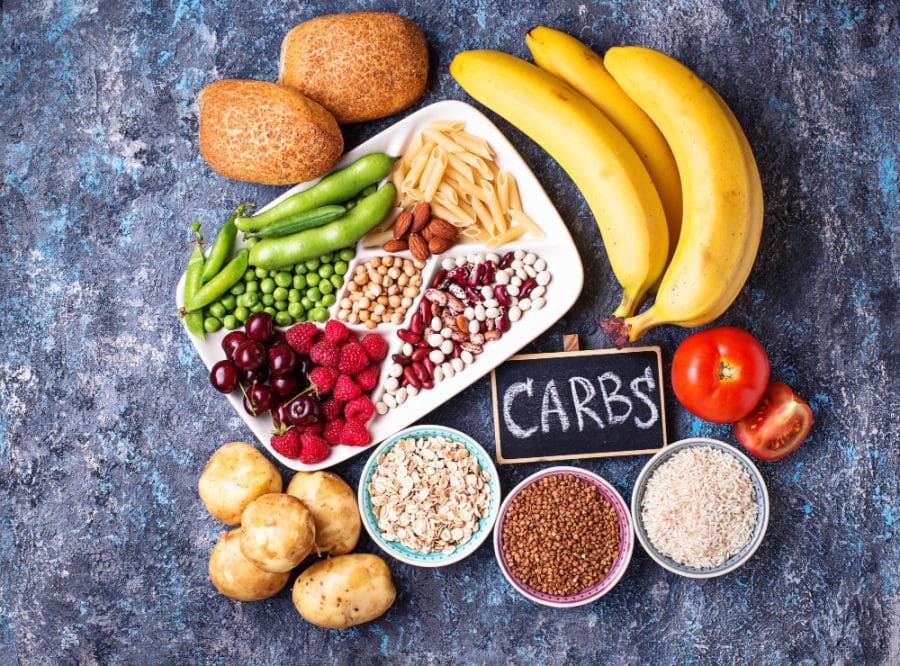Introduction
Carbohydrates, often referred to simply as "carbs," are a primary source of energy for our bodies, powering everything from daily movements to intense workouts. They play a central role in brain function, supporting concentration and mood. Despite their importance, there is a lot of debate about how many carbs we actually need each day. While some advocate for low-carb diets to lose weight or improve health, others support a balanced intake to fuel active lifestyles. So, how many carbs per day is ideal?
This number can vary widely depending on individual factors like age, lifestyle, activity level, and personal health goals. For instance, someone trying to lose weight may require fewer carbs than an endurance athlete who relies on carbs for sustained energy. Finding your ideal amount of carbs per day involves understanding what works best for your unique needs and goals, rather than following a one-size-fits-all guideline. In this post, we’ll explore how to determine your optimal daily carb intake and make adjustments as needed.
Affiliate Disclaimer
This blog post may include links to affiliate sites. If you click on an affiliate link and make a purchase, we may earn a small commission or receive other compensation at no extra cost to you. Please note that many of the links on our site are affiliate links. Our use of these links does not impact the products, services, or websites we recommend to you. This disclaimer covers all forms of communication with you, including our website, email, phone, social media, products, and other platforms.
Amazon Affiliate Disclaimer
We participate in the Amazon Services LLC Associates Program, an affiliate marketing program that allows us to earn fees by linking to Amazon.com and its affiliated sites. If you click on an Amazon affiliate link on our site and make a purchase, we may receive a small commission at no additional cost to you.
1. Introduction to Carbohydrates
Carbohydrates are one of the three macronutrients that fuel our bodies, alongside proteins and fats. They are vital for providing quick energy to cells, supporting brain function, and maintaining muscle strength. Yet, with so many diet trends and varying health advice, many people wonder how many carbs per day is appropriate for optimal health and energy. Understanding carbohydrates and how they work in the body can be the first step toward figuring out how much you need based on your own health and wellness goals.

What Are Carbohydrates?
Carbohydrates are compounds found in foods like grains, fruits, vegetables, and dairy products. They’re broken down into glucose (sugar) in the body, which is then used as fuel for our cells and organs. Carbohydrates come in two primary forms: simple and complex. Simple carbs are quickly digested, leading to rapid blood sugar spikes; these include sugars found in soda, candy, and many processed foods. Complex carbs, like those found in whole grains, legumes, and starchy vegetables, break down more slowly and offer sustained energy along with fiber and nutrients.
Why Carbs Matter in Your Diet
Carbohydrates are the body’s preferred source of energy, especially for the brain and muscles during physical activity. For this reason, understanding how many carbs per day to consume can make a significant difference in daily energy levels, focus, and overall health. Carbs also play a role in hormone regulation, mood stabilization, and digestion due to their fiber content.
While some people benefit from a low-carb lifestyle, others may need a higher intake to support athletic performance, muscle gain, or cognitive function. Knowing how many carbs per day is right for you requires looking at your individual needs rather than following broad dietary guidelines. While the general recommendation from health organizations suggests that carbs should make up 45-65% of total daily calories, this range can vary based on factors like metabolism, age, gender, and activity level.
The Benefits of Finding Your Ideal Carb Balance
Learning to identify your optimal carb intake allows you to tailor your diet to your specific lifestyle and goals. The right balance can help with weight management, prevent energy slumps, and support muscle recovery after exercise. Ultimately, finding the answer to how many carbs per day you need requires a mix of scientific knowledge and personal experimentation, which we’ll guide you through in this post.
2. Understanding Daily Carb Needs
Determining how many carbs per day you need starts with an understanding of the unique role carbohydrates play in fuelling the body. Carbs are the body’s primary source of energy, converted to glucose and stored as glycogen in muscles and the liver. They are essential for fuelling the brain, muscles, and other organs, especially during physical activity. However, the right amount of carbs varies widely depending on individual factors, including lifestyle, health goals, and metabolic needs.

Factors Influencing Carb Intake
The question of how many carbs per day a person needs isn’t straightforward because several key factors come into play:
- Age: Younger individuals often require more carbs to support growth and higher energy demands.
- Gender: Men and women may have different metabolic needs and responses to carbs, partly influenced by hormones.
- Activity Level: The more active a person is, especially if engaged in endurance sports, the higher their carb needs.
- Metabolic Rate: People with higher metabolism may need more carbs to maintain energy levels and prevent muscle loss.
- Health Goals: Goals like weight loss, muscle gain, or enhanced athletic performance all influence the ideal carb intake.
These factors mean that the best answer to "how many carbs per day" is personalized, adapting to meet the body’s fluctuating demands.
The Role of Carbs in Energy and Health
Carbohydrates play several crucial roles beyond just providing immediate energy. When considering how many carbs per day you need, it’s essential to understand the variety of functions they serve:
- Energy Production: Carbs are the most readily available fuel source for activities ranging from walking to intense exercise. Glycogen stores in the muscles provide sustained energy during prolonged activity.
- Brain Function: Glucose from carbs is the primary energy source for the brain, helping maintain concentration, mood, and cognitive function.
- Metabolic Health: The type and amount of carbs consumed influence blood sugar stability and insulin response, which is vital for managing weight and reducing the risk of metabolic disorders.
Balancing carb intake based on these functions helps maintain energy levels throughout the day, reduce cravings, and support overall well-being. Choosing the right amount of carbs can prevent the "energy crashes" often linked to low-carb or unbalanced diets.
Why Customizing Carb Intake Is Important
There is no universal answer for how many carbs per day is best. While general guidelines recommend that 45-65% of daily calories come from carbs, this range is broad. For someone with high physical demands, a higher percentage may be ideal, whereas those aiming to lose weight may benefit from a lower intake. Customizing your carb intake based on your health, activity, and personal goals allows you to leverage carbs effectively for optimal health, energy, and performance.
3. Recommended Carb Intake for Different Goals
When it comes to setting an ideal daily carb intake, it’s essential to consider your personal health and fitness goals. Knowing how many carbs per day to consume can vary depending on whether your primary objective is weight loss, muscle gain, or maintaining balanced energy levels. Below are guidelines to help you determine the right carb intake to support each of these goals.

For Weight Loss
If weight loss is your goal, reducing carb intake can be an effective strategy to help the body burn fat more efficiently. A lower-carb approach encourages the body to tap into fat stores for energy, particularly if you’re consuming fewer calories overall. For many people on a weight loss journey, aiming for around 50-150 grams of carbs per day can help promote fat loss without compromising energy levels. However, the exact amount may vary based on factors like body composition, metabolism, and exercise levels.
How many carbs per day is ideal for weight loss? Some people benefit from a very low-carb diet, such as the ketogenic diet, which typically involves consuming fewer than 50 grams of carbs daily. Others might find that a moderate reduction, such as 100-150 grams of carbs, works better for sustainable weight loss while maintaining energy for daily activities.
| Gender | Age Range | Weight Range (lbs) | Weight Range (kg) | Daily Carb Intake (grams) |
|---|---|---|---|---|
| Male | 18-29 | 100-150 lbs | 45-68 kg | 100-150 |
| 151-200 lbs | 69-91 kg | 125-175 | ||
| 201-250 lbs | 92-113 kg | 150-200 | ||
| 251-300 lbs | 114-136 kg | 175-225 | ||
| 301+ lbs | 137+ kg | 200-250 | ||
| 30-49 | 100-150 lbs | 45-68 kg | 90-140 | |
| 151-200 lbs | 69-91 kg | 115-165 | ||
| 201-250 lbs | 92-113 kg | 140-190 | ||
| 251-300 lbs | 114-136 kg | 160-210 | ||
| 301+ lbs | 137+ kg | 180-230 | ||
| 50-69 | 100-150 lbs | 45-68 kg | 80-120 | |
| 151-200 lbs | 69-91 kg | 100-150 | ||
| 201-250 lbs | 92-113 kg | 120-170 | ||
| 251-300 lbs | 114-136 kg | 140-190 | ||
| 301+ lbs | 137+ kg | 160-210 | ||
| 70+ | 100-150 lbs | 45-68 kg | 70-100 | |
| 151-200 lbs | 69-91 kg | 90-130 | ||
| 201-250 lbs | 92-113 kg | 110-150 | ||
| 251-300 lbs | 114-136 kg | 130-170 | ||
| 301+ lbs | 137+ kg | 150-190 |
| Gender | Age Range | Weight Range (lbs) | Weight Range (kg) | Daily Carb Intake (grams) |
|---|---|---|---|---|
| Female | 18-29 | 90-120 lbs | 41-54 kg | 90-130 |
| 121-150 lbs | 55-68 kg | 100-140 | ||
| 151-200 lbs | 69-91 kg | 120-160 | ||
| 201-250 lbs | 92-113 kg | 140-180 | ||
| 251+ lbs | 114+ kg | 160-200 | ||
| 30-49 | 90-120 lbs | 41-54 kg | 80-120 | |
| 121-150 lbs | 55-68 kg | 90-130 | ||
| 151-200 lbs | 69-91 kg | 110-150 | ||
| 201-250 lbs | 92-113 kg | 130-170 | ||
| 251+ lbs | 114+ kg | 150-190 | ||
| 50-69 | 90-120 lbs | 41-54 kg | 70-100 | |
| 121-150 lbs | 55-68 kg | 80-110 | ||
| 151-200 lbs | 69-91 kg | 100-130 | ||
| 201-250 lbs | 92-113 kg | 120-150 | ||
| 251+ lbs | 114+ kg | 140-170 | ||
| 70+ | 90-120 lbs | 41-54 kg | 60-90 | |
| 121-150 lbs | 55-68 kg | 70-100 | ||
| 151-200 lbs | 69-91 kg | 90-120 | ||
| 201-250 lbs | 92-113 kg | 110-140 | ||
| 251+ lbs | 114+ kg | 130-160 |
For Muscle Gain
Building muscle requires a higher level of energy and an increase in protein and carb intake to support recovery and growth. Carbs are especially important for muscle gain because they help replenish glycogen stores after workouts, fueling muscle recovery and performance. If muscle gain is your goal, you might consider a daily carb intake between 250-400 grams, depending on your total calorie needs and workout intensity.
For those active strength training, determining how many carbs per day to consume can be critical to maintaining progress and energy in the gym. Balancing carbs with protein post-workout also supports faster recovery and muscle repair, which can enhance muscle-building results over time.
For Balanced Energy
If your goal is to maintain steady energy levels throughout the day, focusing on moderate carb intake with balanced meals is key. For most people, a daily intake of 45-65% of total calories from carbs works well for supporting daily activities, mental focus, and stable blood sugar levels. This could range from 150-300 grams of carbs per day, depending on individual calorie requirements.
How many carbs per day you need for balanced energy depends on your daily schedule, activity level, and metabolism. This approach focuses on slow-digesting, complex carbs that provide a sustained energy release, preventing blood sugar spikes and crashes. Adjusting carb intake to meet your daily demands helps maintain mental clarity and reduce fatigue without overloading on quick sugars.
4. Types of Carbohydrates to Consider
Not all carbs are created equal. When determining how many carbs per day you need, understanding the types of carbohydrates you consume can help you make healthier, more effective choices. Carbohydrates can generally be divided into two main types: simple and complex. Each type affects your body differently, especially when it comes to energy levels, blood sugar, and overall health. Choosing the right types of carbs is as important as determining the quantity you need.

Simple vs. Complex Carbs
The difference between simple and complex carbs lies in their chemical structure and how quickly they’re digested. This difference has a significant impact on energy levels and health.
- Simple Carbs: Simple carbohydrates consist of sugars, such as glucose and fructose, which are quickly broken down and absorbed by the body. Foods high in simple carbs include sweets, sodas, pastries, and many processed foods. These carbs can cause rapid spikes in blood sugar, leading to a quick energy boost followed by a crash. If you’re wondering how many carbs per day should come from simple carbs, a general recommendation is to keep these minimal, as they can contribute to cravings, weight gain, and energy fluctuations.
- Complex Carbs: Complex carbs, on the other hand, are composed of longer chains of sugar molecules, making them slower to digest. Foods high in complex carbs include whole grains, legumes, vegetables, and starchy foods like sweet potatoes. These carbs provide steady energy, improve digestion, and support stable blood sugar levels. When deciding how many carbs per day to consume, prioritizing complex carbs is beneficial for sustained energy and overall health.
Choosing Quality Carbs for Optimal Health
When planning daily carb intake, it’s essential to choose carbs that offer nutritional benefits beyond just energy. Fiber-rich carbs, for instance, are found in whole foods like fruits, vegetables, and grains. These types of carbs help with digestion, promote a feeling of fullness, and improve blood sugar control. Incorporating fiber into your diet can aid in weight management, reduce cholesterol, and prevent blood sugar spikes.
Consider how many carbs per day should come from natural, whole foods versus refined sources. Whole food sources are nutrient-dense, containing vitamins, minerals, and antioxidants that support overall health. For example, a bowl of oatmeal or a serving of quinoa provides complex carbs and fiber, as well as essential nutrients like magnesium and B vitamins. In contrast, refined carbs, such as white bread or sugary cereals, offer little nutritional value and can disrupt energy balance.
Making Smart Carb Choices
Ultimately, the key to determining how many carbs per day you should consume is to balance your intake with the types of carbs that support your energy and health goals. Choosing complex, fiber-rich carbs over simple, refined ones can lead to more stable energy, improved digestion, and better long-term health outcomes. Whether your goal is weight loss, muscle gain, or balanced energy, focusing on quality carbs can help you achieve optimal results.
5. How to Track and Adjust Your Carb Intake
Finding the right balance of carbohydrates requires some tracking and adjustment over time. While general recommendations can provide a baseline, discovering how many carbs per day works best for you involves monitoring your body’s response to different levels of intake. Tracking carbs doesn’t have to be complex; with a few tools and techniques, you can easily keep an eye on your carb consumption, make adjustments as needed, and optimize your diet for better energy and health outcomes.
Calculating Your Ideal Carb Intake
The first step in tracking carb intake is to estimate a starting target based on your goals, activity level, and calorie requirements. Many health guidelines suggest that 45-65% of daily calories should come from carbohydrates, but this range can be narrowed down based on specific objectives. For example, if you’re aiming for weight loss, a daily intake of 100-150 grams of carbs might be appropriate, while those focused on muscle gain might consume 250-400 grams of carbs daily.

To calculate how many carbs per day you should start with, begin by determining your daily calorie needs (using an online calculator or consulting a nutritionist). Once you have your calorie goal, calculate 45-65% of that amount for carbs, then divide by 4 (since each gram of carbs contains about 4 calories) to get your daily carb target in grams. This initial calculation provides a starting point, which you can adjust as needed.
Using Tools and Apps for Carb Tracking
Carb tracking apps like MyFitnessPal, Cronometer, and Carb Manager make it easy to monitor your intake and understand how different foods fit into your daily goals. These apps allow you to log your meals, track macronutrient distribution, and adjust your diet in real time. By consistently tracking how many carbs per day you consume, you can quickly identify trends in your energy levels, mood, and performance that relate to your carb intake.
Apps also provide insights into the types of carbs you’re consuming—whether they’re primarily coming from fruits, vegetables, grains, or processed sources. This breakdown helps you fine-tune your intake to focus on high-quality, complex carbs rather than simple sugars or refined carbs.
Signs You May Need More or Fewer Carbs
Your body’s response to carb intake can help indicate if adjustments are needed. For example, if you frequently feel fatigued or experience energy crashes, you might benefit from increasing complex carbs. Conversely, if you’re struggling with weight gain or sluggish digestion, it may help to reduce your carb intake slightly and focus on balanced meals with adequate protein and fats.
Adjusting how many carbs per day you consume is a flexible process that responds to your energy needs, exercise intensity, and personal health goals. By tracking intake, using helpful tools, and listening to your body’s feedback, you can find the optimal carb balance that supports your lifestyle, whether you’re aiming for weight loss, muscle gain, or balanced energy.
6. Sample Carb Amounts Based on Common Diets
When determining how many carbs per day to consume, it’s useful to look at examples from popular diet approaches. Different diets have various carbohydrate ranges tailored to specific health outcomes, from weight loss to athletic performance. By exploring these ranges, you can identify which might suit your personal goals and lifestyle, giving you a better sense of where to start and how to adjust your intake as needed.

Low-Carb Diets (e.g., Keto)
Low-carb diets are designed to minimize carb intake, often resulting in the body switching to burning fat as a primary fuel source. This category includes the ketogenic (keto) diet, which typically restricts carbs to fewer than 50 grams per day, focusing on high-fat and moderate protein intake. For many on a keto diet, daily carb intake falls between 20-50 grams, which helps promote a metabolic state known as ketosis. This approach can be effective for weight loss and managing blood sugar, but it may not suit those with high physical activity needs.
If you’re considering a low-carb diet, calculating how many carbs per day aligns with your lifestyle and health goals is essential. Keto and other low-carb diets require commitment and planning, as very low carb intake may not provide sufficient energy for intense exercise or other high-demand activities.
Moderate-Carb Diets (Balanced Approach)
Moderate-carb diets are often balanced in their macronutrient distribution, offering flexibility in food choices and a sustainable approach for most lifestyles. In this approach, daily carb intake generally ranges from 100-200 grams, depending on calorie needs. A moderate-carb diet allows for a variety of fruits, vegetables, whole grains, and legumes, providing ample fiber and nutrients while supporting steady energy.
This approach is ideal for those who want a balanced diet without extreme carb restrictions. When determining how many carbs per day to consume within this range, consider your activity level, as moderately active individuals may need closer to 150-200 grams of carbs, while less active people might aim for the lower end of the range.
High-Carb Diets (Athletic and High-Performance)
High-carb diets are popular among athletes and those with very high physical demands. For those in intensive training or endurance sports, carbs play a key role in energy and recovery. High-carb diets typically include 250-400+ grams of carbs per day, with a focus on complex carbs from sources like whole grains, fruits, and starchy vegetables.
When assessing how many carbs per day are needed on a high-carb diet, consider the intensity and duration of your activities. Athletes may require more carbs for glycogen replenishment, quick energy, and muscle recovery.
Each of these diets offers a different perspective on carb intake, highlighting the importance of customizing your approach based on personal needs and lifestyle. Understanding the variety of carb ranges within these diets can guide you to find the best daily carb intake for your goals.
7. Conclusion
Determining how many carbs per day is optimal depends on your unique needs, lifestyle, and health goals. Carbohydrates are a primary energy source, and finding the right balance can significantly impact your physical and mental well-being. Whether you aim to lose weight, build muscle, or maintain steady energy throughout the day, knowing your ideal carb intake can help you reach those goals more effectively.
Finding the Right Carb Balance for You
As we’ve explored, there is no one-size-fits-all answer to how many carbs per day you should consume. Tracking your intake, listening to your body’s feedback, and making small adjustments over time are effective ways to fine-tune your diet. Some may thrive on a low-carb diet, while others may need moderate or even high-carb intake to support their lifestyle.
Final Tips for Adjusting Carb Intake
Remember, flexibility is key. Your carb needs may change as your goals evolve, so periodically re-evaluating your intake can be beneficial. Choose quality carbs, focus on whole foods, and be mindful of how your body responds to different carb levels. This tailored approach will support long-term health, energy, and satisfaction in your diet.


